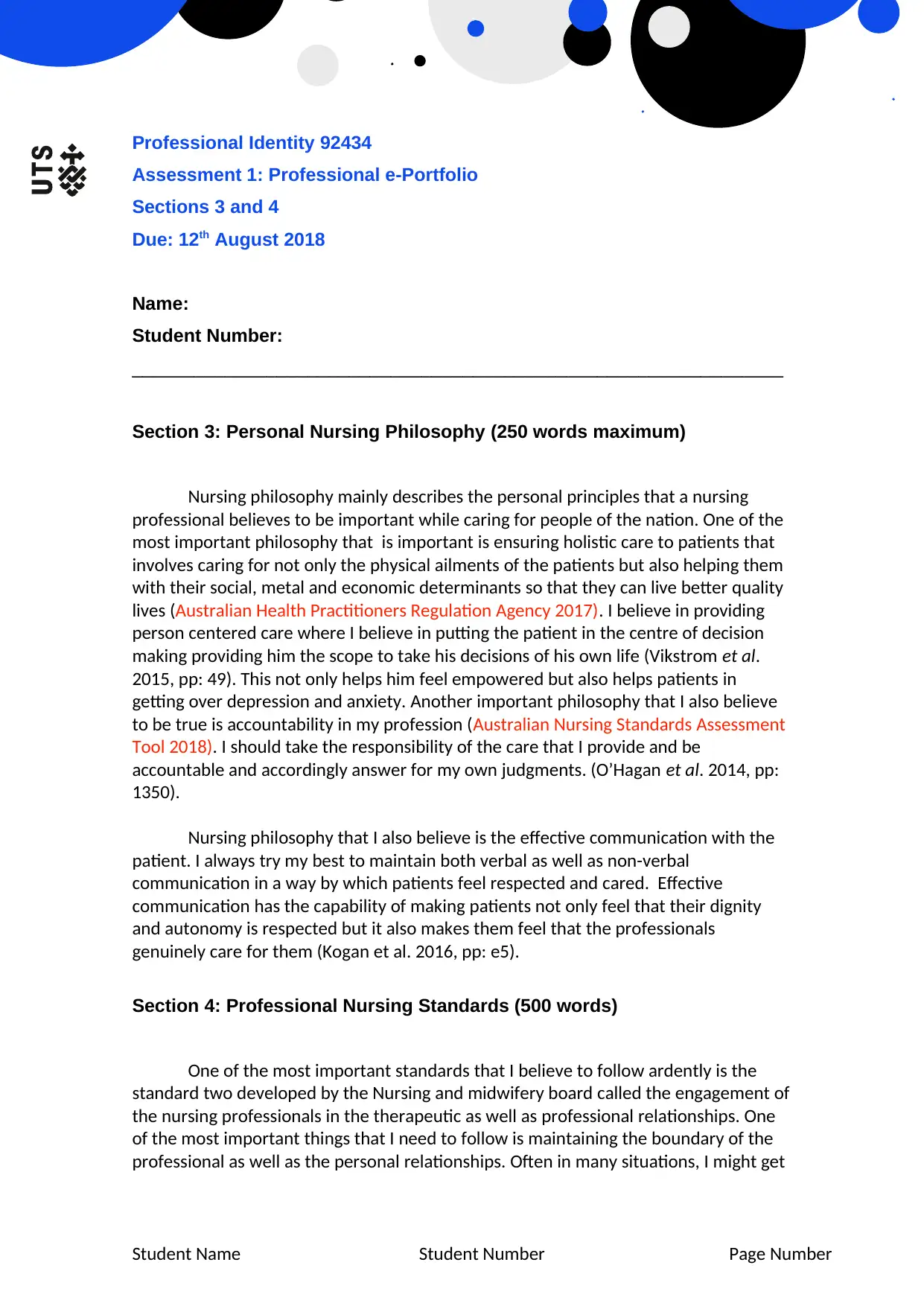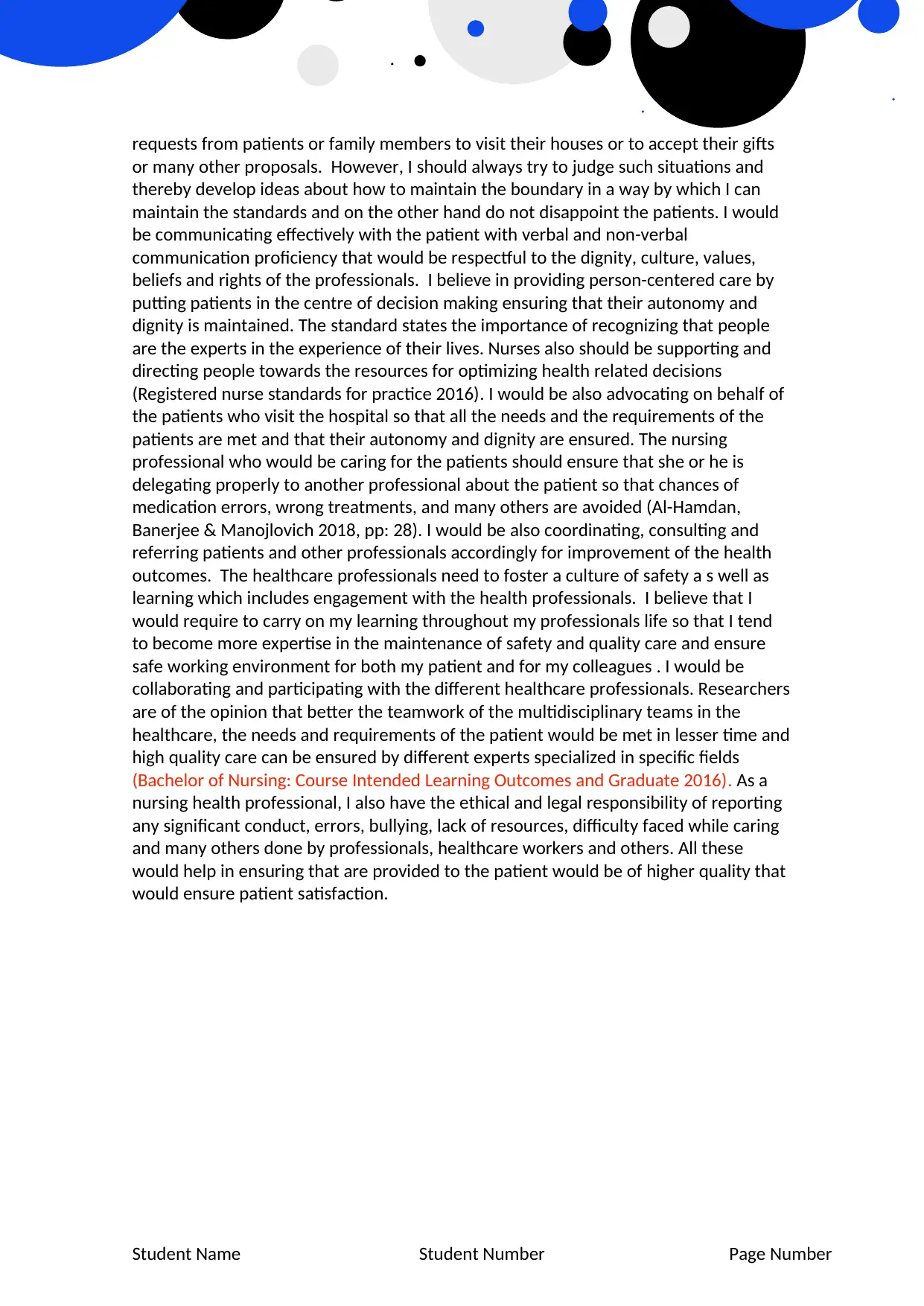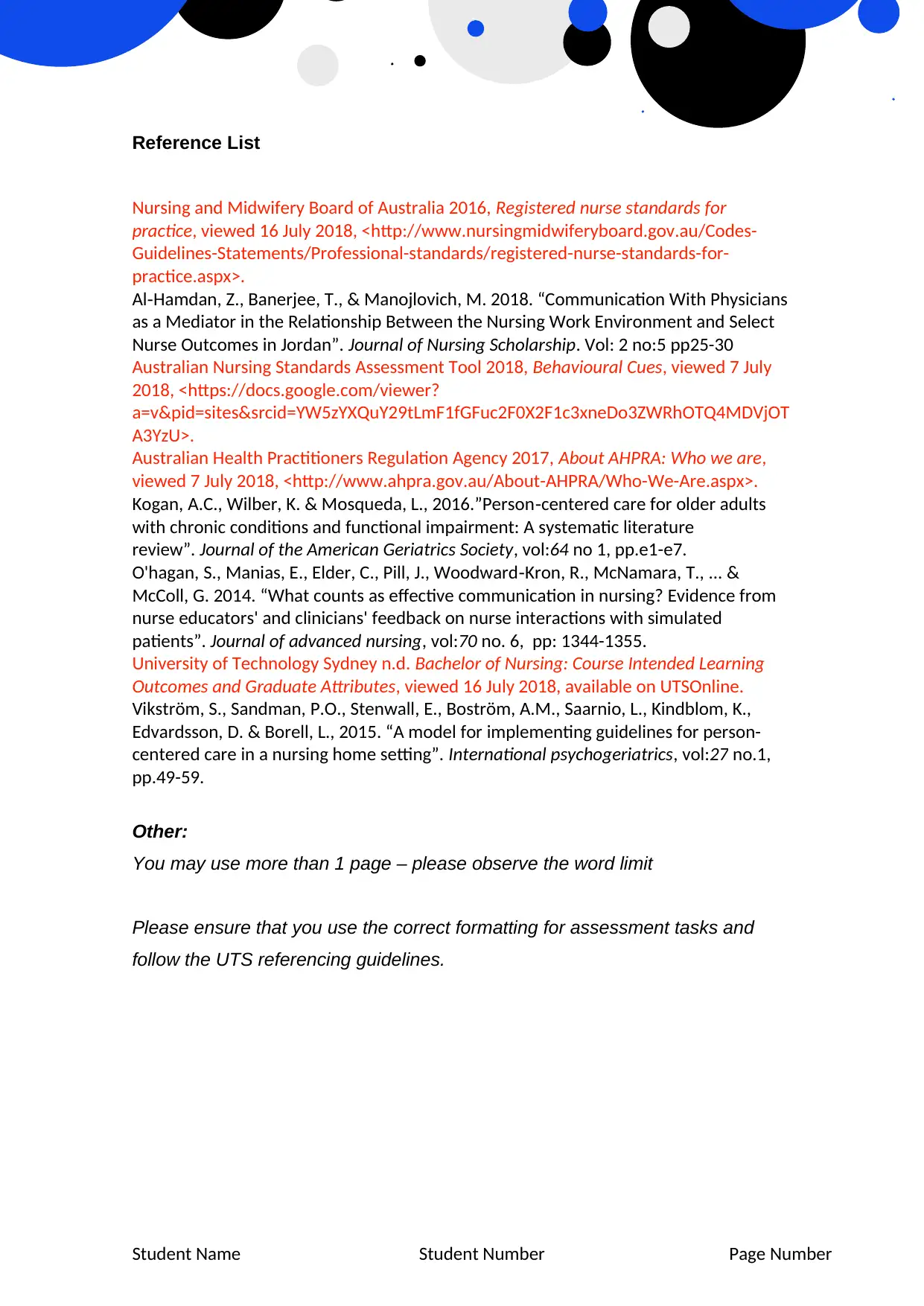UTS 92434 Professional Identity: Nursing e-Portfolio & Standards
VerifiedAdded on 2023/06/09
|3
|1255
|319
Portfolio
AI Summary
This nursing e-portfolio presents a student's personal nursing philosophy, emphasizing holistic and person-centered care, accountability, and effective communication. It also addresses professional nursing standards, particularly focusing on engaging in therapeutic and professional relationships, maintaining boundaries, and providing safe, appropriate, and responsive quality nursing practice. The portfolio highlights the importance of respecting patient dignity, culture, values, and beliefs, as well as advocating for patients' needs and coordinating care with other healthcare professionals. The student also acknowledges the ethical and legal responsibilities of reporting misconduct and fostering a culture of safety and continuous learning. References to relevant nursing standards and scholarly articles support the portfolio's claims and demonstrate a commitment to professional development.

Professional Identity 92434
Assessment 1: Professional e-Portfolio
Sections 3 and 4
Due: 12th August 2018
Name:
Student Number:
_______________________________________________________________
Section 3: Personal Nursing Philosophy (250 words maximum)
Nursing philosophy mainly describes the personal principles that a nursing
professional believes to be important while caring for people of the nation. One of the
most important philosophy that is important is ensuring holistic care to patients that
involves caring for not only the physical ailments of the patients but also helping them
with their social, metal and economic determinants so that they can live better quality
lives (Australian Health Practitioners Regulation Agency 2017). I believe in providing
person centered care where I believe in putting the patient in the centre of decision
making providing him the scope to take his decisions of his own life (Vikstrom et al.
2015, pp: 49). This not only helps him feel empowered but also helps patients in
getting over depression and anxiety. Another important philosophy that I also believe
to be true is accountability in my profession (Australian Nursing Standards Assessment
Tool 2018). I should take the responsibility of the care that I provide and be
accountable and accordingly answer for my own judgments. (O’Hagan et al. 2014, pp:
1350).
Nursing philosophy that I also believe is the effective communication with the
patient. I always try my best to maintain both verbal as well as non-verbal
communication in a way by which patients feel respected and cared. Effective
communication has the capability of making patients not only feel that their dignity
and autonomy is respected but it also makes them feel that the professionals
genuinely care for them (Kogan et al. 2016, pp: e5).
Section 4: Professional Nursing Standards (500 words)
One of the most important standards that I believe to follow ardently is the
standard two developed by the Nursing and midwifery board called the engagement of
the nursing professionals in the therapeutic as well as professional relationships. One
of the most important things that I need to follow is maintaining the boundary of the
professional as well as the personal relationships. Often in many situations, I might get
Student Name Student Number Page Number
Assessment 1: Professional e-Portfolio
Sections 3 and 4
Due: 12th August 2018
Name:
Student Number:
_______________________________________________________________
Section 3: Personal Nursing Philosophy (250 words maximum)
Nursing philosophy mainly describes the personal principles that a nursing
professional believes to be important while caring for people of the nation. One of the
most important philosophy that is important is ensuring holistic care to patients that
involves caring for not only the physical ailments of the patients but also helping them
with their social, metal and economic determinants so that they can live better quality
lives (Australian Health Practitioners Regulation Agency 2017). I believe in providing
person centered care where I believe in putting the patient in the centre of decision
making providing him the scope to take his decisions of his own life (Vikstrom et al.
2015, pp: 49). This not only helps him feel empowered but also helps patients in
getting over depression and anxiety. Another important philosophy that I also believe
to be true is accountability in my profession (Australian Nursing Standards Assessment
Tool 2018). I should take the responsibility of the care that I provide and be
accountable and accordingly answer for my own judgments. (O’Hagan et al. 2014, pp:
1350).
Nursing philosophy that I also believe is the effective communication with the
patient. I always try my best to maintain both verbal as well as non-verbal
communication in a way by which patients feel respected and cared. Effective
communication has the capability of making patients not only feel that their dignity
and autonomy is respected but it also makes them feel that the professionals
genuinely care for them (Kogan et al. 2016, pp: e5).
Section 4: Professional Nursing Standards (500 words)
One of the most important standards that I believe to follow ardently is the
standard two developed by the Nursing and midwifery board called the engagement of
the nursing professionals in the therapeutic as well as professional relationships. One
of the most important things that I need to follow is maintaining the boundary of the
professional as well as the personal relationships. Often in many situations, I might get
Student Name Student Number Page Number
Paraphrase This Document
Need a fresh take? Get an instant paraphrase of this document with our AI Paraphraser

requests from patients or family members to visit their houses or to accept their gifts
or many other proposals. However, I should always try to judge such situations and
thereby develop ideas about how to maintain the boundary in a way by which I can
maintain the standards and on the other hand do not disappoint the patients. I would
be communicating effectively with the patient with verbal and non-verbal
communication proficiency that would be respectful to the dignity, culture, values,
beliefs and rights of the professionals. I believe in providing person-centered care by
putting patients in the centre of decision making ensuring that their autonomy and
dignity is maintained. The standard states the importance of recognizing that people
are the experts in the experience of their lives. Nurses also should be supporting and
directing people towards the resources for optimizing health related decisions
(Registered nurse standards for practice 2016). I would be also advocating on behalf of
the patients who visit the hospital so that all the needs and the requirements of the
patients are met and that their autonomy and dignity are ensured. The nursing
professional who would be caring for the patients should ensure that she or he is
delegating properly to another professional about the patient so that chances of
medication errors, wrong treatments, and many others are avoided (Al-Hamdan,
Banerjee & Manojlovich 2018, pp: 28). I would be also coordinating, consulting and
referring patients and other professionals accordingly for improvement of the health
outcomes. The healthcare professionals need to foster a culture of safety a s well as
learning which includes engagement with the health professionals. I believe that I
would require to carry on my learning throughout my professionals life so that I tend
to become more expertise in the maintenance of safety and quality care and ensure
safe working environment for both my patient and for my colleagues . I would be
collaborating and participating with the different healthcare professionals. Researchers
are of the opinion that better the teamwork of the multidisciplinary teams in the
healthcare, the needs and requirements of the patient would be met in lesser time and
high quality care can be ensured by different experts specialized in specific fields
(Bachelor of Nursing: Course Intended Learning Outcomes and Graduate 2016). As a
nursing health professional, I also have the ethical and legal responsibility of reporting
any significant conduct, errors, bullying, lack of resources, difficulty faced while caring
and many others done by professionals, healthcare workers and others. All these
would help in ensuring that are provided to the patient would be of higher quality that
would ensure patient satisfaction.
Student Name Student Number Page Number
or many other proposals. However, I should always try to judge such situations and
thereby develop ideas about how to maintain the boundary in a way by which I can
maintain the standards and on the other hand do not disappoint the patients. I would
be communicating effectively with the patient with verbal and non-verbal
communication proficiency that would be respectful to the dignity, culture, values,
beliefs and rights of the professionals. I believe in providing person-centered care by
putting patients in the centre of decision making ensuring that their autonomy and
dignity is maintained. The standard states the importance of recognizing that people
are the experts in the experience of their lives. Nurses also should be supporting and
directing people towards the resources for optimizing health related decisions
(Registered nurse standards for practice 2016). I would be also advocating on behalf of
the patients who visit the hospital so that all the needs and the requirements of the
patients are met and that their autonomy and dignity are ensured. The nursing
professional who would be caring for the patients should ensure that she or he is
delegating properly to another professional about the patient so that chances of
medication errors, wrong treatments, and many others are avoided (Al-Hamdan,
Banerjee & Manojlovich 2018, pp: 28). I would be also coordinating, consulting and
referring patients and other professionals accordingly for improvement of the health
outcomes. The healthcare professionals need to foster a culture of safety a s well as
learning which includes engagement with the health professionals. I believe that I
would require to carry on my learning throughout my professionals life so that I tend
to become more expertise in the maintenance of safety and quality care and ensure
safe working environment for both my patient and for my colleagues . I would be
collaborating and participating with the different healthcare professionals. Researchers
are of the opinion that better the teamwork of the multidisciplinary teams in the
healthcare, the needs and requirements of the patient would be met in lesser time and
high quality care can be ensured by different experts specialized in specific fields
(Bachelor of Nursing: Course Intended Learning Outcomes and Graduate 2016). As a
nursing health professional, I also have the ethical and legal responsibility of reporting
any significant conduct, errors, bullying, lack of resources, difficulty faced while caring
and many others done by professionals, healthcare workers and others. All these
would help in ensuring that are provided to the patient would be of higher quality that
would ensure patient satisfaction.
Student Name Student Number Page Number

Reference List
Nursing and Midwifery Board of Australia 2016, Registered nurse standards for
practice, viewed 16 July 2018, <http://www.nursingmidwiferyboard.gov.au/Codes-
Guidelines-Statements/Professional-standards/registered-nurse-standards-for-
practice.aspx>.
Al‐Hamdan, Z., Banerjee, T., & Manojlovich, M. 2018. “Communication With Physicians
as a Mediator in the Relationship Between the Nursing Work Environment and Select
Nurse Outcomes in Jordan”. Journal of Nursing Scholarship. Vol: 2 no:5 pp25-30
Australian Nursing Standards Assessment Tool 2018, Behavioural Cues, viewed 7 July
2018, <https://docs.google.com/viewer?
a=v&pid=sites&srcid=YW5zYXQuY29tLmF1fGFuc2F0X2F1c3xneDo3ZWRhOTQ4MDVjOT
A3YzU>.
Australian Health Practitioners Regulation Agency 2017, About AHPRA: Who we are,
viewed 7 July 2018, <http://www.ahpra.gov.au/About-AHPRA/Who-We-Are.aspx>.
Kogan, A.C., Wilber, K. & Mosqueda, L., 2016.”Person‐centered care for older adults
with chronic conditions and functional impairment: A systematic literature
review”. Journal of the American Geriatrics Society, vol:64 no 1, pp.e1-e7.
O'hagan, S., Manias, E., Elder, C., Pill, J., Woodward‐Kron, R., McNamara, T., ... &
McColl, G. 2014. “What counts as effective communication in nursing? Evidence from
nurse educators' and clinicians' feedback on nurse interactions with simulated
patients”. Journal of advanced nursing, vol:70 no. 6, pp: 1344-1355.
University of Technology Sydney n.d. Bachelor of Nursing: Course Intended Learning
Outcomes and Graduate Attributes, viewed 16 July 2018, available on UTSOnline.
Vikström, S., Sandman, P.O., Stenwall, E., Boström, A.M., Saarnio, L., Kindblom, K.,
Edvardsson, D. & Borell, L., 2015. “A model for implementing guidelines for person-
centered care in a nursing home setting”. International psychogeriatrics, vol:27 no.1,
pp.49-59.
Other:
You may use more than 1 page – please observe the word limit
Please ensure that you use the correct formatting for assessment tasks and
follow the UTS referencing guidelines.
Student Name Student Number Page Number
Nursing and Midwifery Board of Australia 2016, Registered nurse standards for
practice, viewed 16 July 2018, <http://www.nursingmidwiferyboard.gov.au/Codes-
Guidelines-Statements/Professional-standards/registered-nurse-standards-for-
practice.aspx>.
Al‐Hamdan, Z., Banerjee, T., & Manojlovich, M. 2018. “Communication With Physicians
as a Mediator in the Relationship Between the Nursing Work Environment and Select
Nurse Outcomes in Jordan”. Journal of Nursing Scholarship. Vol: 2 no:5 pp25-30
Australian Nursing Standards Assessment Tool 2018, Behavioural Cues, viewed 7 July
2018, <https://docs.google.com/viewer?
a=v&pid=sites&srcid=YW5zYXQuY29tLmF1fGFuc2F0X2F1c3xneDo3ZWRhOTQ4MDVjOT
A3YzU>.
Australian Health Practitioners Regulation Agency 2017, About AHPRA: Who we are,
viewed 7 July 2018, <http://www.ahpra.gov.au/About-AHPRA/Who-We-Are.aspx>.
Kogan, A.C., Wilber, K. & Mosqueda, L., 2016.”Person‐centered care for older adults
with chronic conditions and functional impairment: A systematic literature
review”. Journal of the American Geriatrics Society, vol:64 no 1, pp.e1-e7.
O'hagan, S., Manias, E., Elder, C., Pill, J., Woodward‐Kron, R., McNamara, T., ... &
McColl, G. 2014. “What counts as effective communication in nursing? Evidence from
nurse educators' and clinicians' feedback on nurse interactions with simulated
patients”. Journal of advanced nursing, vol:70 no. 6, pp: 1344-1355.
University of Technology Sydney n.d. Bachelor of Nursing: Course Intended Learning
Outcomes and Graduate Attributes, viewed 16 July 2018, available on UTSOnline.
Vikström, S., Sandman, P.O., Stenwall, E., Boström, A.M., Saarnio, L., Kindblom, K.,
Edvardsson, D. & Borell, L., 2015. “A model for implementing guidelines for person-
centered care in a nursing home setting”. International psychogeriatrics, vol:27 no.1,
pp.49-59.
Other:
You may use more than 1 page – please observe the word limit
Please ensure that you use the correct formatting for assessment tasks and
follow the UTS referencing guidelines.
Student Name Student Number Page Number
⊘ This is a preview!⊘
Do you want full access?
Subscribe today to unlock all pages.

Trusted by 1+ million students worldwide
1 out of 3
Related Documents
Your All-in-One AI-Powered Toolkit for Academic Success.
+13062052269
info@desklib.com
Available 24*7 on WhatsApp / Email
![[object Object]](/_next/static/media/star-bottom.7253800d.svg)
Unlock your academic potential
Copyright © 2020–2026 A2Z Services. All Rights Reserved. Developed and managed by ZUCOL.




